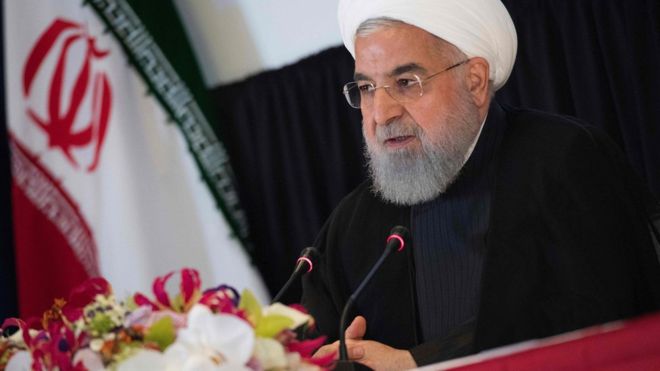Rouhani Falsely Claims Iran’s Imprisoned Dual Nationals Have Been Treated Fairlyخودداری حسن روحانی از پاسخگویی در خصوص وضعیت زندانیان و آزار و اذیت خبرنگاران و تکرار ادعاهای قبلی

SEPTEMBER
28, 2018
Two months after a judge in
Iran told imprisoned Iranian British dual national Nazanin Zaghari-Ratcliffe that her freedom depends on the UK’s dealings with
Iran, Iran’s president has stated on the record that her foreign citizenship
has not impacted her case.
At a press conference on
September 26, 2018, at the United Nations headquarters in New York, President
Hassan Rouhani once again claimed he has done all he can for Iran’s
imprisoned dual nationals, falsely adding he is unable
to secure their freedom.
Rouhani failed to admit that
his own Intelligence Ministry is responsible for the arrest of several dual
nationals under trumped-up national security charges. He also omitted the fact
that after the Joint Comprehensive Plan of Action (JCPOA) was signed between
Iran and world powers in 2015, it was the actions of his government that secured the release of four American dual
nationals and one of their wives in a prisoner swap deal with the US.
“In the past, we have helped
the American government regarding prisoners they were interested in Iran and
there was some assistance regarding our citizens who were held in prison [in
the US]. We have never opposed negotiations between governments to reach
solutions,” Rouhani told reporters.
Asked by a New York Times
reporter about the dual nationals imprisoned in Iran,
namely Zaghari-Ratcliffe, Rouhani responded, “I thought you were going to
express sympathy for all the prisoners in the world.”
Of all the 10 known cases
of dual and foreign nationals as well as foreign
permanent residents currently imprisoned in Iran, Zaghari-Ratcliffe is the only
woman.
Rouhani said: “We must all try
to do what we can to help individuals in prison and the government of Iran is
doing its share by facilitating visits and providing information. But there’s
another body in charge of prosecution and sentencing and that’s the judicial
branch. It’s the same system in every country. When we ask about an Iranian
imprisoned in America, we are told, ‘he has been sentenced by an American court
and the most we can do is offer consular access and provide some facilities.’
Therefore, when you ask me about this, what I can tell you as the head of the
country’s Executive Branch is that I will do everything I can to provide
humanitarian facilities. The Foreign Ministry and the government will help.
Some of those you named have recently been able to go on prison leave for a few
days. That’s the kind of facilities we can provide.”
Asked by a BBC reporter about
the arbitrary arrests of dual nationals, as well as the harassment of BBC Persian Service staff and their families in Iran, Rouhani responded: “It’s
incorrect to say Iran does not recognize dual citizenship. Those who are dual
citizens should not be worried about entering Iran because it’s not a crime.
Legally speaking, we don’t believe anyone has been arrested because of their
dual citizenship. We should look at their case file and see what they have
done.”
Rouhani ignored the question
about the BBC.
In October 2017, the BBC World
Service urged the UN to investigate a court order and injunction by Iran’s
judiciary freezing the assets of 152 BBC Persian staff, current and former, for
allegedly engaging in “conspiracy against national security” in Iran and
abroad. The Iranian judiciary had attempted to create a criminal record for the
BBC staff members in absentia, accusing them of “collaboration and conspiracy
to commit crimes against national security.”
There is no news about the
result of Iran’s investigation, but the BBC has noted that the state’s
persecution campaign has continued unabated since 2009, when the BBC Persian
satellite service was officially launched amid widespread protests against the
results of Iran’s disputed presidential election that year.
The BBC says family members of
its Persian-language service have been arbitrarily arrested and some elderly
members have been interrogated. Staff members have also been the subjects of
smear campaigns and their personal online accounts have been hacked.
The intimidation campaign has become so severe that
staff members of the BBC have been forced to miss the funerals of loved ones in
Iran, fearing arrests by security forces should they return to their country of
birth.
At least 10 dual and foreign
nationals, as well as foreign permanent residents, were imprisoned in Iran as
of September 2018. According to research by the Center for Human Rights in Iran
(CHRI), the arrests are followed by a pattern of prolonged solitary confinement
and interrogations; lack of due process; denial of consular access or visits by
the UN or humanitarian organizations; secretive trials in which the detainee is
given limited access to counsel; and long prison sentences based on vague or
unspecified “national security” and “espionage” charges. Iran says it doesn’t
recognize dual nationality. In November 2017, Reuters reported that at least 30 dual
nationals had been arrested by the Islamic Revolutionary Guards Corps (IRGC)
since the signing of the nuclear deal in July 2015.
Iran has used imprisoned dual
nationals as bargaining chips in its dealings with other nations. The
Iranian judiciary’s ongoing imprisonment of these women and men—arrested by
the IRGC’s Intelligence Organization or the Intelligence Ministry, often while they were
visiting Iran—also reflects Iranian hardliner’s efforts to prevent Iran’s
engagement with the West.
No comments:
Post a Comment